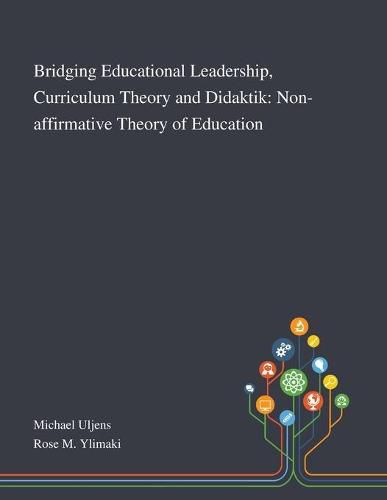Readings Newsletter
Become a Readings Member to make your shopping experience even easier.
Sign in or sign up for free!
You’re not far away from qualifying for FREE standard shipping within Australia
You’ve qualified for FREE standard shipping within Australia
The cart is loading…






This title is printed to order. This book may have been self-published. If so, we cannot guarantee the quality of the content. In the main most books will have gone through the editing process however some may not. We therefore suggest that you be aware of this before ordering this book. If in doubt check either the author or publisher’s details as we are unable to accept any returns unless they are faulty. Please contact us if you have any questions.
This volume argues for the need of a common ground that bridges leadership studies, curriculum theory, and Didaktik. It proposes a non-affirmative education theory and its core concepts along with discursive institutionalism as an analytical tool to bridge these fields. It concludes with implications of its coherent theoretical framing for future empirical research.Recent neoliberal policies and transnational governance practices point toward new tensions in nation state education. These challenges affect governance, leadership and curriculum, involving changes in aims and values that demand coherence. Yet, the traditionally disparate fields of educational leadership, curriculum theory and Didaktik have developed separately, both in terms of approaches to theory and theorizing in USA, Europe and Asia, and in the ways in which these theoretical traditions have informed empirical studies over time. An additional aspect is that modern education theory was developed in relation to nation state education, which, in the meantime, has become more complicated due to issues of ‘globopolitanism’. This volume examines the current state of affairs and addresses the issues involved. In doing so, it opens up a space for a renewed and thoughtful dialogue to rethink and re-theorize these traditions with non-affirmative education theory moving beyond social reproduction and social transformation perspectives. This work was published by Saint Philip Street Press pursuant to a Creative Commons license permitting commercial use. All rights not granted by the work’s license are retained by the author or authors.
$9.00 standard shipping within Australia
FREE standard shipping within Australia for orders over $100.00
Express & International shipping calculated at checkout
This title is printed to order. This book may have been self-published. If so, we cannot guarantee the quality of the content. In the main most books will have gone through the editing process however some may not. We therefore suggest that you be aware of this before ordering this book. If in doubt check either the author or publisher’s details as we are unable to accept any returns unless they are faulty. Please contact us if you have any questions.
This volume argues for the need of a common ground that bridges leadership studies, curriculum theory, and Didaktik. It proposes a non-affirmative education theory and its core concepts along with discursive institutionalism as an analytical tool to bridge these fields. It concludes with implications of its coherent theoretical framing for future empirical research.Recent neoliberal policies and transnational governance practices point toward new tensions in nation state education. These challenges affect governance, leadership and curriculum, involving changes in aims and values that demand coherence. Yet, the traditionally disparate fields of educational leadership, curriculum theory and Didaktik have developed separately, both in terms of approaches to theory and theorizing in USA, Europe and Asia, and in the ways in which these theoretical traditions have informed empirical studies over time. An additional aspect is that modern education theory was developed in relation to nation state education, which, in the meantime, has become more complicated due to issues of ‘globopolitanism’. This volume examines the current state of affairs and addresses the issues involved. In doing so, it opens up a space for a renewed and thoughtful dialogue to rethink and re-theorize these traditions with non-affirmative education theory moving beyond social reproduction and social transformation perspectives. This work was published by Saint Philip Street Press pursuant to a Creative Commons license permitting commercial use. All rights not granted by the work’s license are retained by the author or authors.